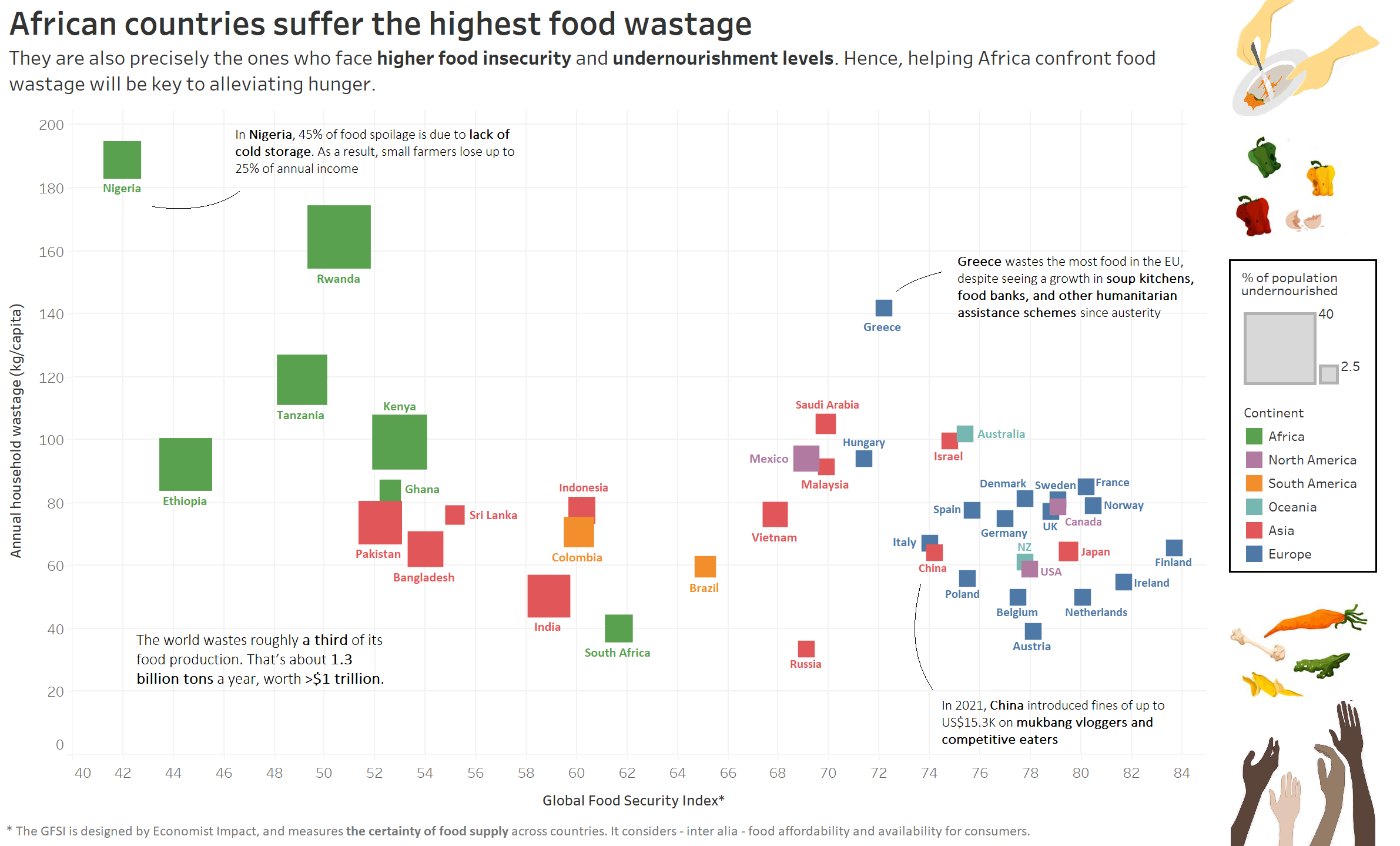Submitted by earthlymonarch t3_ypjw8a in dataisbeautiful
Comments
ethanthe12 t1_ivjyiw4 wrote
Doesn’t most food, after harvesting, or killing the animal. Only stay good for like 2-4 days, (raw), unrefrigerated
royalpatch t1_ivl52fp wrote
Some and unprocessed, sure. With proper storage, i.e., root cellar, potatoes can last months after harvest. Same for most root vegetables. (Carrots, onions, turnips, etc )
Canning can also preserve foods for upto a year usually.
You can also preserve eggs. (I assume meats too, but I've never done that).
vtTownie t1_ivlv9it wrote
Apples in cold storage last >1 year too
Mekito_Fox t1_ivqltfm wrote
Preserving meat would be salting, smoking, or making jerky. Homemade jerky in a fridge can last awhile. This is how it was done before electricity.
itswill95 t1_ivlcae9 wrote
why? this graph only seems to suggest that better refrigeration would lower food waste significantly in Nigeria
TheDadThatGrills t1_ivldd54 wrote
Nigeria has over 200M people and are losing 45% of their food due to lack of refrigeration. The math answers the question.
rammo123 t1_ivlvpa9 wrote
Safe to assume that similar logic applies to the other high-waste African nations too. Only Nigeria is highlighted since it's the worst.
itswill95 t1_ivmo8cp wrote
i dont think so one data point doesnt make a trend
earthlymonarch OP t1_ivjc5fe wrote
Source: UNEP 2021 Food Waste Index Report
Tools: Tableau
Note that due to the lack of data for some countries, UNEP partially uses regional data to extrapolate. Countries whose data rely on such extrapolation have been assigned low confidence levels; hence, I have only included countries with high to medium confidence levels for food waste estimates. More can be found on page 12 of the report.
thatdudeinshorts t1_ivjevxz wrote
I’m reading through the UNEP 2021 report and I’m rather annoyed with this methodology. I understand it from a greenhouse gas standpoint, but the inclusion of non edible materials in “food waste” and saying that land application of excess food/waste counts as “food waste” seems like a serious cultural and structural oversight. The report also seems to meander around the impact of lack of cold storage on food waste, stating in its initial findings that it was not impactful, then later stating that it was massively impactful on Nigeria as an example.
earthlymonarch OP t1_ivjkyl1 wrote
Sources:
- Food waste per capita: UNEP Food Waste Index Report
- Undernourishment rates: World Bank
- Food Security: Economist Impact's Global Food Security Index
rmoritz t1_ivk6vsw wrote
Really nice presentation of the data. Informative, intuitive, and appealing.
AfricanNorwegian t1_ivk4b36 wrote
This is per household though, not per person.
​
The average household in Nigera consists of 5.06 individuals, whereas in Sweden it is only 2.17 individuals.
​
On this graph Sweden appears to waste roughly 80kg of food per household, and Nigeria wastes roughly 190kg per household.
However, divide that per person in each household and Sweden is wasting 36.9kg per person and Nigeria is wasting 37.5kg per person.
​
The graph seems to imply that Nigerians waste 2x more food than Swedes, when actually there is almost no difference.
earthlymonarch OP t1_ivk7hvy wrote
Data explicitly says per capita, not per household. But it is considering all food waste in the household context (vs. retail, production, transport etc.)
AfricanNorwegian t1_ivk9krq wrote
> Annual household wastage (kg/capita)
The per capita here is per household, not per person.
isaacwoods_ t1_ivkekgj wrote
I read it as meaning food waste in the household, as opposed to commercial waste (so still regular per capita, otherwise you’d just write kg/household surely?)
ASuarezMascareno t1_ivkgfpq wrote
My first interpretation is that its household waste normalized per capita (so if a household is 4 people, the per household would be 4 times higher).
AfricanNorwegian t1_ivkh0t4 wrote
Then surely it would say normalised
ASuarezMascareno t1_ivkhyxl wrote
That's what per capita means. Otherwise would say kg/household.
AfricanNorwegian t1_ivko1x7 wrote
Then why mention the household at all if it is just per person.
That’s like me saying “household income per capita” and then saying “no it’s not average household income it’s income per person”. If that were the case I should just say “income per capita”
ASuarezMascareno t1_ivkt2jw wrote
Because it is household waste only. Food wasted in other placed (restaurant, supermarket, industry) is not accounted for.
asseatstonk t1_ivjf386 wrote
Russia is cheating! You just throw it outside and it freezes for millenias to come. I mean, they still have frozen Mammoth-Steaks
rammo123 t1_ivlw1ej wrote
"China introduced fines ... on mukbang vloggers".
I can definitely get behind that.
StealthedWorgen t1_ivkg7l4 wrote
Africa needs to start harnessing the power of the sun to keep things cold.
NeitherCook5241 t1_ivlc2b6 wrote
Can we get Nigeria some fridges plz?
Frisky_Potato42nite t1_ivmregr wrote
I'm surprised on how low the US is. I've seen plenty of pictures of grocery stores toss literal truck loads of still edible food.
OldGloryInsuranceBot t1_ivndwve wrote
The European country with the worst food security is Hungry…. sorry, Hungary.
flitzerad_girl t1_ivnogi9 wrote
Judging from the breakdown by others that the methodology doenst account for the different distribution of agriculture. If a country has larger percentage of its population working as farmers then they'd have a higher wastage by household per capita which doesn't seem accounted for by the other axis judging by the legend.

TheDadThatGrills t1_ivjsqkb wrote
Doesn't seem unreasonable to say that better refrigeration infrastructure globally would lower food waste more than any other factor.